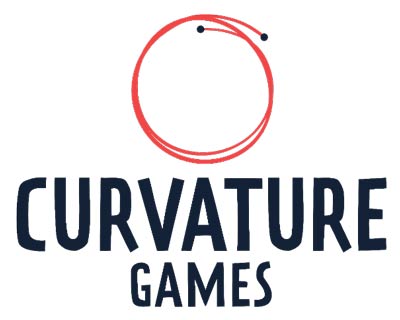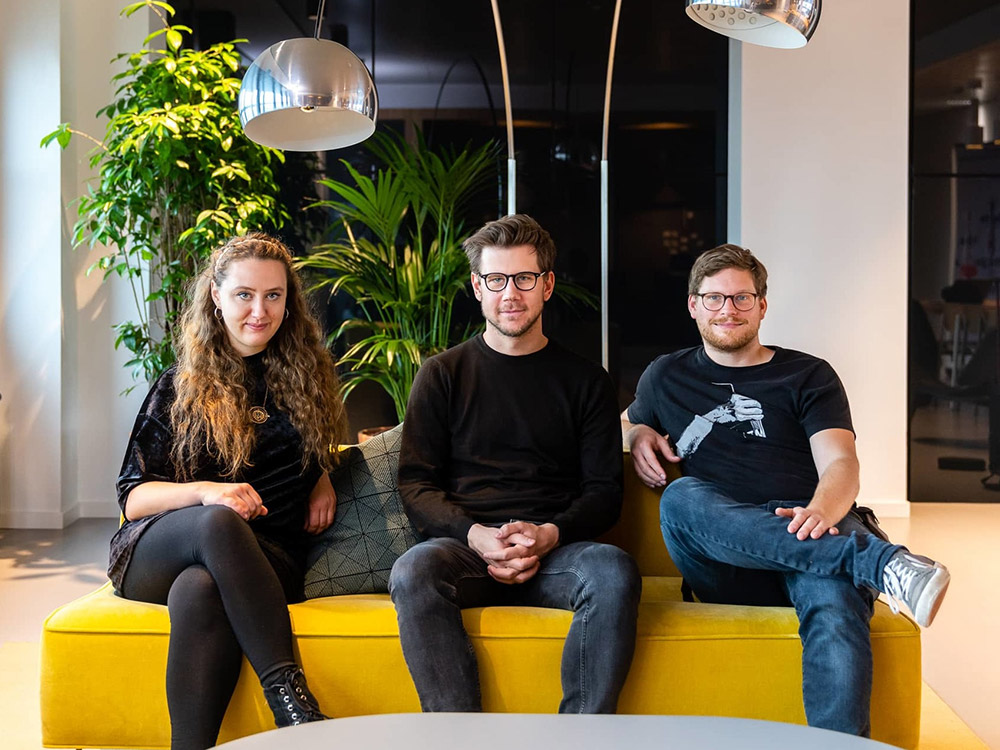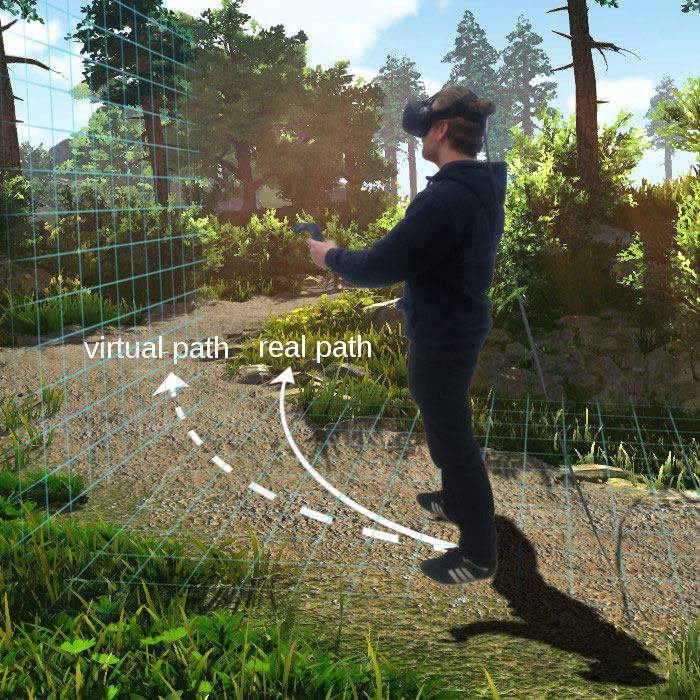Curvature Games

Business idea: Redirected Walking
Industry: IT / Virtual Reality (VR)
Year founded: 2019
The founders run an independent studio for VR games, have a passion for games and VR as a medium for immersive storytelling and fun games
Category
On this page
Curvature Games: walking in the virtual world
In spring 2019, a virtual reality project called Space Walk was launched, the special feature of which is a series of small manipulations in perception. The University of Hamburg’s start-up service and the cross-institutional consulting of “beyourpilot” – since July 2023 under the brand “Startup Port” brand – supported the successful EXIST application, among other things. Ultimately, the startup evolved into the corporation “Curvature Games GmbH”.


In times of Corona and the associated lockdown, the business idea of Space Walk, or Curvature Games, became even more interesting: Escaping your own space for more interesting realms by putting on special glasses. The media hype surrounding virtual reality (VR), which some expected to be nothing less than a revolution in the consumption of digital content, slowly died down… but the technology remained and became a ubiquitous topic that was enthusiastically received across all industries. But like many great technologies, it has its initial teething troubles: “Around half of users can’t tolerate the difference between the real and virtual worlds, they get dizzy or nauseous. This so-called motion sickness is a major problem with virtual reality technology,” explains Eike Langbehn, VR expert at the University of Hamburg. Real and virtual movements rarely match. The result: a feeling like seasickness. Langbehn did his doctorate on this subject at the University of Hamburg. Together with PR expert Dennis Briddigkeit and VR designer Hannah Paulmann, he founded the start-up Space Walk in 2019 to tackle this very problem.
An interest in computers, technology and games has always been there: Eike and Dennis even founded an e-sports club together in 2006. The two boys grew up in rural Brake, between Bremen and Bremerhaven, so they had to tackle things themselves to make things happen: “The club still exists today: the big LAN party takes place twice a year with around 200 people,” reports Dennis, not without pride. After leaving school, he studied journalism and worked for a Hamburg PR agency that looked after the German market for Facebook. Eike, on the other hand, worked for a mobile game developer and concentrated on his computer science studies. His doctoral thesis under the supervision of Prof. Steinicke from HCI in the Department of Computer Science at the University of Hamburg was entitled “Walking in Virtual Reality: Perceptually-inspired Interaction Techniques for Locomotion in Immersive Environments”. Eike basically addressed the aforementioned teething problem of VR: the discrepancy between real and virtual movement. And the associated problems: On the one hand, the user should be simulated a long path through a house with many rooms, while in reality he hardly moves from the spot due to lack of space. On the other hand, the aforementioned motion sickness had to be tackled.
First contact with the start-up service of the University of Hamburg
In early summer 2018, Eike visited Universität Hamburg’s start-up service for the first time to get an assessment of his doctoral thesis with regard to a start-up idea and to find out about potential funding measures. The advisors found the topic of the doctoral thesis extremely exciting and promising for EXIST funding. However, Eike did not yet have a suitable team at the time, the business model still needed to be fleshed out and he also wanted to complete his dissertation. So there was still a lot to do. Meanwhile, start-up consultant Dr. Andrea Otto kept in touch to keep him informed and motivated. In March 2019, Eike finally decided to submit an EXIST application with Prof. Steinicke from the University of Hamburg as his mentor. But not alone: in the meantime, he found a partner with the necessary business administration and marketing background in Dennis Briddigkeit. In addition, Hannah Paulmann joined as art director, computer game developer and third co-founder.
Start-up support since spring 2019
The University of Hamburg’s start-up service and beyourpilot start-up consultants Dr. Andrea Otto and Dr. Bettina Otto (editor’s note: “beyourpilot” has been operating under the “Startup Port” brand since July 2023) provided support in drafting the EXIST application in spring 2019. “The focus here was on convincingly presenting the areas of ‘innovation’, ‘market & economic success prospects’ and ‘team’,” reports Dr. Andrea Otto. “We always consult with them, read through things again and then give feedback,” adds Dr. Bettina Otto. The application was successful, also thanks to the intensive collaboration between beyourpilot and the University of Hamburg’s start-up service. Nadine Weitendorf provided support with the submission of applications and administrative support for the projects. Since the start of the EXIST project, the start-up team has regularly discussed progress with Dr. Bettina Otto and Nadine Weitendorf. Space Walk is currently working intensively on an operational prototype: the University of Hamburg has provided them with the appropriate premises and the necessary infrastructure at the Informatics Center in Stellingen as part of EXIST. Space Walk also completed nextMedia.Hamburg’s MEDIA LIFT incubator program in October 2019 and subsequently won the “Best Innovation” category in the nextReality.Contest.
The newly founded “Curvature Games GmbH” receives InnoRampUp funding
Finally, the capital company “Curvature Games GmbH” was founded. Since August 2020, the trio has been receiving InnoRampUp funding from IFBInnovationsstarter. The program supports technologically highly innovative start-ups in Hamburg in particular with a grant of up to 150,000 euros to strengthen the local start-up scene and help build promising companies. Since the launch of InnoRampUp, more than 100 projects have already been supported in this way.
The startup applied with a project in which an LBE platform is being developed: This is a complete package of hardware and software aimed at event locations that want to expand their offering to include VR. “We are now developing the platform from August (2020) until the end of next year with the funding. This support means a lot to us, as it secures us in 2021 and thus as a direct follow-up to our EXIST grant. It means we can continue and also confirms that we are not completely on the wrong track with our idea – the renewed approval from the diverse award committee is a strong motivation,” says Dennis with relief.
The start-up uses the funding to finance the founders’ salaries on a pro rata basis so that the project can be pursued further. In addition, it can now also be used to pay for any additional staff required. However, a lot of the money will go towards product development. For now, the team has a lot to do: “The entire funding project is measured against milestones, so we’re not resting on our laurels now, but quite the opposite: rolling up our sleeves and getting started,” explains Dennis with motivation. The release of their own VR game is planned for the end of 2021. So the idea got rolling.
The goal: “Redirected Walking” without “Motion Sickness”
This idea also takes up most of the office space in Stellingen. Carefully marked on the floor is a four by four meter square. This is the place that represents the (virtual) world: the startup has developed a prototype in which the user moves within these 16 square meters while walking through a virtual world that is 42 square meters in size. To do this, they superimpose the images of the virtual space slightly rotated. So when the user moves around in the virtual space, they unconsciously make slight turns in reality. This subtle manipulation is called “redirected walking” and makes more effective use of the available space without causing a feeling of “motion sickness”. Other ways of influencing virtual perception are also being worked on.
Interested parties for this technology include private individuals, who usually only have a very limited space available on which they can use VR. On the other hand, the invention is aimed at operators of large arcades for VR gaming and VR escape rooms. Their operators want to make optimum use of their space in order to have room for as many customers as possible. “In principle, the idea can be applied to all industries that use VR technology where virtual journeys are made,” explains Eike.
The prototype is 90% complete, but test operations are naturally difficult during the pandemic: “We had several partners for this, but unfortunately they have closed due to the current coronavirus situation and it is not yet certain when they will be allowed to reopen,” says Dennis, describing the problem. The start-up is currently working on a concept for implementing playtesting in compliance with hygiene regulations.
International industry interest in the start-up is high: alongside the USA and Japan, Universität Hamburg’s Informatics Center is currently one of the global pioneers. “East Asia is the world leader in VR gaming, but Hamburg is top in terms of research. Interested parties have even traveled from Japan to get up to speed,” emphasizes Dennis. When it comes to VR, the trio is initially focusing exclusively on the gaming industry: the three passionate gamers not only see this as their core competence, but also the greatest economic potential.